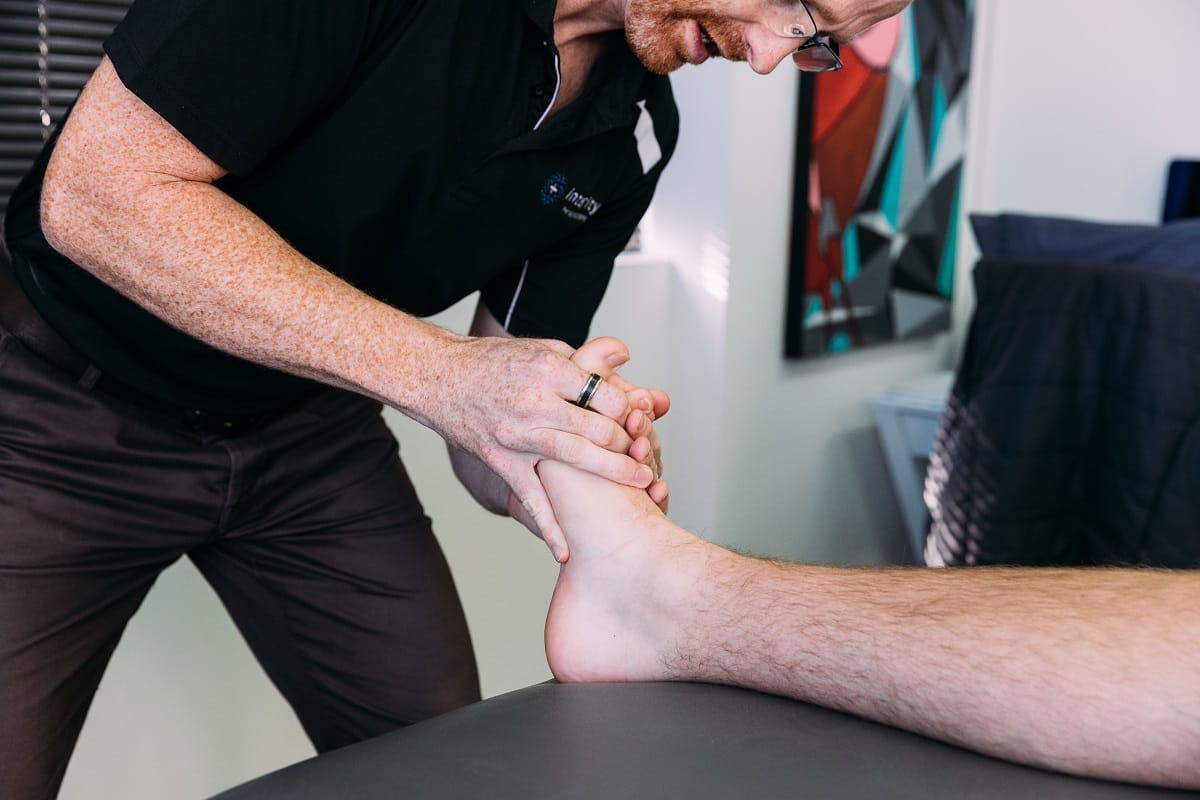
If you’re reading this, we’re going to assume you’ve got some pain in your feet (and trust us, you’re not alone). Plantar fasciitis has a way of making even the shortest walks feel like a marathon.
The good news?
There are some straightforward strategies to help ease the discomfort and get you back on your feet—literally.
What causes plantar fasciitis?
Firstly, it’s good to know what causes plantar fasciitis so you can take steps to prevent it in the future. Plantar fasciitis develops when the plantar fascia—a thick band of tissue connecting the heel to the toes—becomes irritated or inflamed. This can happen for several reasons:
- Overuse or high-impact activities: Repetitive stress from activities like running, jumping, or long periods of standing can strain the plantar fascia over time.
- Improper footwear: Shoes that lack adequate arch support or cushioning can contribute to the problem, especially if you’re frequently on hard surfaces.
- Foot structure: Conditions like flat feet, high arches, or an abnormal walking pattern can place extra stress on the plantar fascia, leading to inflammation.
- Weight gain: Carrying extra weight increases the load on the feet, putting more pressure on the plantar fascia. This is particularly common during pregnancy or rapid weight gain.
Addressing these factors can be key in preventing flare-ups and finding relief from plantar fasciitis pain.
Home remedies you can try for plantar fasciitis pain relief
1. Stretching exercises
Stretching the plantar fascia, calves, and Achilles tendon helps reduce tension in the foot and can improve flexibility over time.
Try calf stretches or rolling the arch of your foot over a frozen water bottle for 1-2 minutes. Aim to stretch daily, especially before activities that you’ve noticed in the past give you foot tension.
2. Icing the foot (RICE method)
As one of the steps in RICE (Rest, Ice, Compression, Elevation), icing helps manage inflammation and numb pain.
Apply an ice pack to the affected area for 15-20 minutes, 2-3 times a day. Rest your foot, use compression wraps if swelling is present, and elevate it above heart level to further reduce swelling.
3. Foot massages
Massaging the foot promotes circulation and helps ease tightness, making it great for relief after a long day.
Use your thumbs to apply pressure along the arch, or roll your foot over a spiky massage ball for a few minutes to target deeper tissue.
4. Invest in proper footwear and insoles / inserts
Wearing shoes with good arch support and cushioning can help alleviate symptoms and prevent recurrence.
Consider adding custom orthotic insoles or gel inserts to provide extra support, especially if you stand for long periods or have flat feet.
5. Night splints
Night splints keep your foot in a stretched position while you sleep, which can help reduce morning pain and stiffness.
Wear a night splint regularly to stretch the plantar fascia overnight, aiming for several hours each night for best results.
6. Over-the-counter pain relief
Nonsteroidal anti-inflammatory drugs (NSAIDs) can help manage pain and inflammation during flare-ups.
Use NSAIDs as needed, but consult with a healthcare provider if you’re taking them frequently, especially if you have any existing health conditions.
7. Plantar fasciitis socks
Compression socks designed for plantar fasciitis can provide gentle pressure to reduce inflammation and support the arch.
Wear them during the day or even while sleeping to promote circulation and reduce discomfort.
How to prevent plantar fasciitis
Preventing plantar fasciitis largely comes down to reducing strain on the feet and keeping the plantar fascia healthy. Here are some tips to help avoid flare-ups:
- Continue to wear your supportive footwear: Stick with shoes that provide good arch support and cushioning, especially if you’re frequently on your feet. Avoid worn-out shoes, and consider using insoles for extra support to keep your feet protected.
- Maintain a healthy weight: Keeping your weight in a healthy range can reduce the stress placed on your feet, lowering the risk of plantar fasciitis returning. This is especially important if you’ve experienced rapid weight changes in the past.
- Stretch before and after activities: Incorporate regular foot and calf stretches, especially before and after exercise, to keep the plantar fascia and surrounding muscles flexible. This helps reduce tension and prevent strain.
- Be cautious with high-impact activities: Avoid overdoing high-impact activities like running or jumping. If you engage in these activities, gradually increase intensity and take breaks to give your feet time to recover.
- Focus on strengthening your feet and legs: Regularly perform exercises that target the muscles in your feet and lower legs to improve stability and support the plantar fascia. This can help prevent reinjury.
When to seek professional treatment
While home remedies can be helpful, there are times when professional treatment is necessary. If you experience any of the following, it’s time to consult with a physiotherapist:
- Persistent pain: If the pain doesn’t improve after a few weeks of home care, or keeps getting worse, it’s important to seek professional help to address the underlying cause.
- Difficulty walking: When plantar fasciitis affects your ability to walk or perform daily activities, a physiotherapist can provide tailored treatments and guidance to help you recover.
- Recurring symptoms: If plantar fasciitis keeps coming back, a physiotherapist can help identify contributing factors and recommend a more comprehensive treatment plan.
- Swelling or severe inflammation: When symptoms include significant swelling or redness, it may indicate a more serious condition that requires medical attention.
A physiotherapist can offer advanced treatments, such as manual therapy, tailored stretching programs, or specialised equipment to support your recovery. Seeking professional care can make a big difference, especially if your symptoms are not improving with home remedies alone.
[H2] Your path to recovery starts with Integrity Physio
Managing plantar fasciitis at home can go a long way in relieving pain and preventing future flare-ups. Simple remedies like stretching, icing, and wearing supportive footwear can be effective for many people. However, if symptoms persist, seeking professional help from a physio can provide the relief you need.
At Integrity Physiotherapy, we offer plantar fasciitis treatment in Perth, with a focus on personalised care to help you get back on your feet. Our experienced team can guide you through advanced treatments and tailored exercise programs to support your recovery and reduce the risk of recurrence.
Book an appointment today to see how we can help you overcome plantar fasciitis and stay pain-free.



